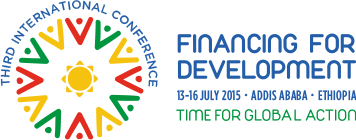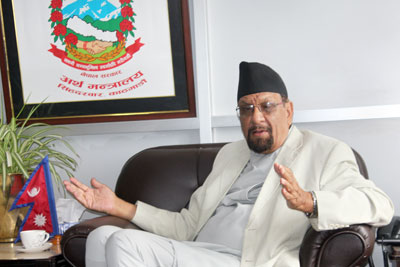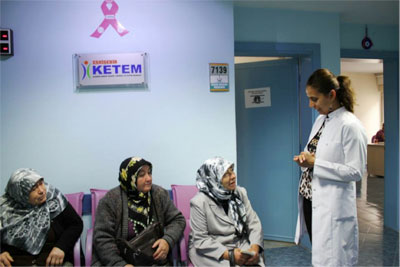Financing: Why it matters for women and girls

Facts & Figures | News & speeches | In pictures | Stories | Events |
Join the conversation
The Issue
From letting women have a say in where village water holes are built, to ensuring cash-transfer programmes benefit all, to making sure women have maternal health clinics nearby and can access them when the need arises – financing for gender equality is the means to ensure that women’s needs are met in development planning.
Financing for development is about money. For development to reach people in all parts of the world, adequate financing is required so that commitments made by world leaders translate into action. For funds to benefit everyone equally and equitably, targeted efforts are often needed. For example, if women don’t have access to safe transportation or low-cost childcare, few will be able to take advantage of important social or vocational programmes.
But inclusive development isn’t cheap, and project planning and financing often neglects the specific needs of women. For decades, there has been chronic underinvestment in women’s empowerment, which has hampered progress on women’s rights and gender equality.

To disrupt the status quo, and ensure that financing for gender equality doesn’t get sidelined at the “Third International Conference on Financing for Development” in Addis Ababa, Ethiopia from 13-16 July 2015, UN Women is focusing on this historic opportunity to endorse comprehensive global financing for women everywhere.
This is the first of three key global conferences in 2015 that will determine the international community’s roadmap for the next 15 years (to be followed by the UN Summit to adopt the post-2015 development agenda in New York in September and the UN Climate Change Conference which will seek a legally binding universal agreement on climate change in Paris in December). The negotiated outcome adopted in Addis Ababa will set the stage for the ambitious new sustainable development goals of the post-2015 agenda, which is set to include a stand-alone goal on gender equality. But such a goal and gender-sensitive targets across other goals can become a reality only with the right financing.

The knowledge, technology and money to achieve gender equality and women’s empowerment exist. Now is the time to make important choices. We need commitment to unprecedented levels of financing – in scale, scope, and quality – to implement gender equality objectives of the post-2015 development agenda, from all sources, at all levels. Women everywhere need dedicated and consistent investment and resources. Let’s seize this moment!
What financing for development looks like for women:

In OECD-DAC reviews, only 5 per cent of all aid targeted gender equality as a principal objective in 2012-2013. When it comes to investing in women’s economic empowerment, the percentage was even lower – 2 per cent – and aid to economic and productive sectors has remained flat.
Investments in gender equality are vastly insufficient and only a small proportion of aid addresses women’s specific needs. Women everywhere need prioritized, dedicated and consistent investment and resources.

Globally, women on average are paid 24 per cent less than men.
Concerted efforts are needed by all stakeholders to transform the global economic and financial architecture. We need to address the structural causes of inequalities with specific policies. To address gender inequality in pay, governments, employers and trade unions can focus on an array of solutions from national minimum wage policies to providing well-paid, protected public sector care jobs to ensuring that equal pay laws are implemented.

Gender parity in school enrolment is close to being reached worldwide, particularly at the primary level; however, very few countries have achieved that target at all levels of education. On average around the world, adult women have 7.3 mean years of schooling while men have 8.2.
Girls who enroll in school must also be able to complete their education, at all levels, and not drop off along the way. States need to prioritize investments in such as dedicated toilets for girls, adequate infrastructure, literacy and technology programmes, as well as pre-school care so mothers can go to school.

Globally, only half of women participate in the labour force, compared to three quarters of men. In developing regions, up to 95 per cent of women’s employment is informal, in jobs that are unprotected by labour laws and lack social protection.
Reforms and innovations are needed in the provision of social transfers and social services to ensure that they reach women and girls and respond to their needs. These can narrow gender gaps in poverty rates; enhance women’s income security provide a lifeline for poor women.

According to the WHO, HIV/AIDS is the leading cause of death among women of reproductive age in developing countries.
Gender inequality contributes to the spread of HIV, with violence against women or unequal power dynamics increasing infection rates. Women often have less information about HIV and fewer resources to take preventive measures, as well as less access to treatment and support. Women also assume a disproportionate burden of care for those affected.
We need to integrate women's needs into strategies and budgets to help halt the spread of HIV/AIDS, as well as to mitigate its impact on women.

Globally, women spend 2.5 times more of their time on unpaid care and domestic work than men.
Providing paid leave and child-care services makes it easier for women and men to combine paid and unpaid work, expanding women’s employment choices, and access to education and training.
News & speeches
- Financing for development outcome bolsters gender equality (24 July 2015)
- UN Women Executive Director: As we move forward, we will seek opportunities to win traction for, and achieve, the deep changes in the global financial architecture (23 July 2015)
- FFD3 Conference yields commitment to financing for gender equality (16 July 2015)
- “With these tools, we know WHAT needs to be done and HOW it can be done” – UN Women closing statement at FFD3 (16 July 2015)
- Press release: Countries reach historic agreement to generate financing for new sustainable development agenda (15 July 2015)
- "The expectations of an ambitious post-2015 development agenda must be matched with transformative financing for gender equality" – Lakshmi Puri (14 July, 2015)
- UN Women steers three high-level side events at the Financing for Development Conference (14 July 2015)
- Finding a new balance — a blog by the Executive Director (13 July 2015)
- UN Women Deputy Executive Director: Only through a transformative financing for gender equality agenda will the post-2015 commitments become a living reality (10 July 2015)
- Ahead of Financing Conference, women’s groups highlight critical gender equality issues (10 July 2015)
- Financing for Gender Equality: Results and Good Practices — a brochure (9 July 2015)
- Press release: Transformative financing will end gender inequality by 2030 (8 July 2015)
- Workshop stresses the importance of financing for gender equality, post-2015 (June 2015)
- Mobilizing greater financing for gender equality (April 2015)
- “We urge you to place gender equality and women’s empowerment at the heart of the Financing for Development discussions and negotiations” – Executive Director (April 2015)
- Ending gender inequality through the post-2015 agenda (January 2015)
Stories

Q&A with Nepal’s Finance Minister
As the world community gathers in Addis Ababa, Ethiopia for the third International Conference on Financing for Development this week, UN Women sat down with Nepal’s Minister of Finance Ram Sharan Mahat to discuss how this developing country has been able to prioritize gender equality in its planning and budgeting, as well as its achievements and the challenges ahead, particularly after the recent earthquakes

Budgets respond to the needs of women in Morocco
The needs of women and girls are increasingly being reflected in how governments spend in Morocco and a new organic law of finance passed in January 2014 by the Council of Government has cemented gender throughout the budgeting process.

Changing the landscape with all-women worksites in India
Rural women are now able to demand work, manage worksites and ensure wages are paid, largely due to a Fund for Gender Equality project that has reached over 30,000 women in 69 villages in northern India. UN Women provides technical support for the world’s largest pay-for-work programme.

Rural women access early cancer screening in Turkey
After receiving UN Women training on gender-responsive budgeting, a municipality in central Turkey analysed their public services and realized that women living outside the city could not access free cancer diagnosis and screening services. They now reach thousands of rural women with education and free transportation to screening centres.

In Ethiopia, rural women improve their lives, befriending budgets
In rural communities across Ethiopia, community women are increasingly influencing local planning and budgeting, ensuring that water collection spots are built closer to villages, women’s access to credit is increasing and that health services for pregnant women are improving.
Gender-Responsive Budgeting in Southeast Asia
This video focuses on the use of Gender-Responsive Budgeting in the Philippines, Timor-Leste and Indonesia as a tool to promote development and women's rights. Testimonies from government officials and other advocates underline the role they can play promoting development. The video further outlines continuing challenges, as well as other strategies to enhance gender-responsive budgeting, while exploring the final impact on development.
Shaping a Revolution: Transforming social protection for women in Egypt
Launched in 2008, the Egyptian Conditional Cash Transfer programme – under which low-income families get financial support from the government as long as they meet certain conditions – was based on Latin American models. But the team behind it, led by Egyptian feminist researcher Hania Sholkamy, rebuilt it with women’s rights as its core. They made sure that women were compensated for any time spent fulfilling the conditions, recognizing and rewarding their unpaid care work, and that payment be made through bank transfers so women could keep control of their own finances. Delivering results for some of Egypt’s most marginalized women, the programme is now finally going national, with a budget allocation to cover half a million families in six months.
Making rights real: Transforming women’s lives in north-eastern Brazil
A government initiative that provides professional training and education on rights and citizenship is transforming women's lives in north-eastern Brazil. Chapéu de Palha Mulher provides women with a mandatory three-month course in public policy, taught by feminist trainers, and a small monthly stipend and childcare to support their participation. After completing the course, participants select professional training, often opting to develop skills for traditionally male-oriented jobs. Launched in 2007 to provide alternatives for female sugarcane farmers during the off-harvest months, nearly 100,000 women have since participated in the programme, which has expanded to 89 municipalities in Pernambuco.
Counting women in: Putting gender equality at the heart of governance in Morocco
In Morocco the gender impact of any policy is not an afterthought - it is considered right from the word go. For example when a school is planned, money is put aside to ensure that there are adequate toilets that can be used by girls. Since 2005 Morocco has produced a gender report providing a vital tool to ensure accountability and in 2007 the Prime Minister of Morocco sent a letter to all departments urging them to take up gender-responsive budgeting. Currently, a total of 27 departments, accounting for more than 80 per cent of the government’s budget, have adopted the tool. A new landmark was reached in 2014, with the passing of a new finance law, which legally obliges the government to consider gender throughout the budget process.
Events:
10 July, 2015
8.30 – 10.45 a.m., Dreamliner Hotel, Addis Ababa: Opening Session — Women’s Forum on Financing Gender Equality – Welcome and Opening Address by the Ethiopian Government's State Minister of Women, Children and Youth Affairs, Frenesh Mekuria, the Deputy Executive Director of UN Women, Lakshmi Puri, and an NGO representative, to be followed by a discussion of objectives, the agenda and outcomes presented by the organizing committee members (FEMNET, WWG on FfD), and presentations and comments by experts and key stakeholders, feminist organizations, civil society representatives, government representatives, etc. Read our coverage on the opening session. Read our full event coverage here.
7-9 p.m. there will be a reception organized together with CSO Addis Coordination Group.
14 July, 2015
8.15 a.m. – 9.45 a.m. at the Africa Hall, ECA Conference Center, Addis Ababa: "Financing for Gender Equality – Results and Good Practices” with the World Bank Group with participation by UNSG Ban Ki-moon, WBG President Jim Yong Kim, the Swedish prime minister, ministers, civil society and private sector to focus on effective examples of financing for gender equality. UN Women’s Executive Director will moderate the event.
1.15 p.m. – 2.45 p.m. at the MARS Room, Elilly International Hotel, Addia Ababa: “Transformative financing for gender equality and women’s empowerment” with participation by ministers from a range of Member States (Brazil, Sweden, Switzerland, Ethiopia (TBC), India, Indonesia, the Netherlands, United Kingdom, and more) to mobilize greater political support for a comprehensive financing framework to meet gender commitments of the post-2015 development agenda. This event will launch the Addis Ababa Action Plan for Transformative Financing for gender equality and women’s empowerment. UN Women’s Deputy Executive Director Lakshmi Puri will speak.
2.45 p.m. – 4 p.m. at the Hilton Hotel, Addis Ababa: International Business Forum. Issues of discussion include: Sustainable Supply Chains; sustainable sourcing and production; improving engagement of women in private sector development. UN Women’s Executive Director will take part as a panelist.
6–8 p.m. at the Radisson Blu Hotel, Addis Ababa: Financing for Gender Equality: Placing Women at the Centre of the SDGs in Africa. Hosted by UNECA and the Ethiopian Government, co-organized by UN Women, UNDP, and UNECA. This side event aims to interrogate the above through an interactive panel discussion involving policymakers from Ministries of Finance, Ministries of Gender as well as other development partners and UN agencies. The evening-time event will involve high level discussions deliberating on lessons learned in financing for gender equality, sharing best practices and success stories as well as highlighting key gaps to be addressed in achieving gender equality and women’s empowerment in the Post-2015 development agenda. UN Women’s Executive Director will speak at the event.
Join the conversation on financing for gender equality:
- Main hashtags: #FFD3, #FFgenderequality, #action2015
- Main Twitter accounts: @UN_Women (English), @ONUMujeres (Spanish), @ONUFemmes (French), @unwomenafrica
- Main Facebook accounts: UN Women (English), ONU Mujeres (Spanish), ONU Femmes (French), UN Women Africa
- Other accounts: Instagram, Google+, Pinterest
- Follow our accounts for coverage and share content from our social media package, which is available with images, videos and sample promotional messages in English, Spanish and French here.



